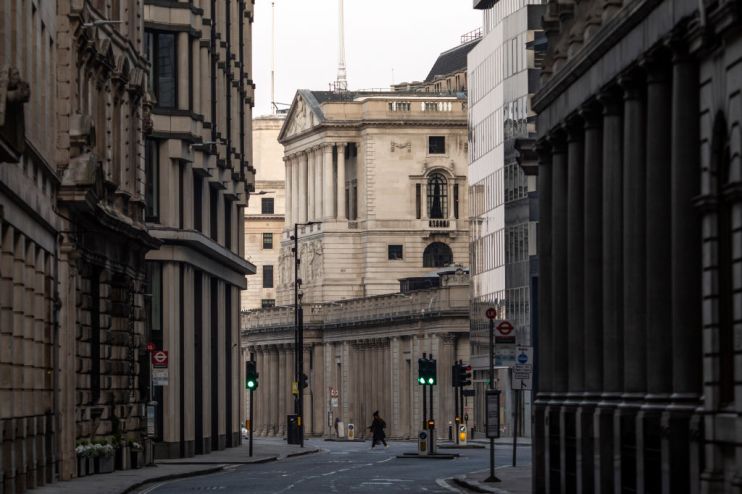Economists question Bank of England’s ‘optimistic’ forecast

The Bank of England today kept interest rates on hold and said the UK economy would not shrink as much as initially thought this year, but it said the recovery would take longer.
But some economists have questioned the assumptions, arguing that high unemployment will damage the economy.
The Bank said the UK economy was likely to shrink by 9.5 per cent this year. It predicted it would grow nine per cent in 2021. In May, it said GDP could shrink by 14 per cent this year and grow by 15 per cent in 2021.
The Bank unanimously left interest rates on hold at their record low levels. It also added negative interest rates to its ‘toolbox’ of possible measures for the first time.
Here’s what economists made of the Bank’s pronouncements.
Bank ‘out on a limb’ with upbeat forecast
“Some of [the bank’s] assumptions around the return of furloughed employees to work in the fourth quarter seem optimistic,” said Yael Selfin, chief economist at KPMG.
The Bank said unemployment would hit 7.5 per cent this year, then drop to six per cent at the end of 2021. That would mean unemployment staying below the levels seen in the financial crisis.
Selfin said: “The cloud of a second wave and further localised lockdowns is likely to keep many businesses in sectors such as hospitality operating at reduced capacity at best.”
She said they will be “unable to bring back a large share of their workers”.
Jacqui Douglas, chief european macro strategist at TD Securities, said: “The BoE still has some of the most optimistic macro forecasts on the street.”
The Bank said the UK economy will recover its pre-coronavirus size by the end of next year. But Douglas said it is “far out on a limb” in looking for such a “swift economic recovery”.
“We’re likely in for a round of further growth downgrades [in] November.” She also predicted “upgrades to the unemployment rate” as “it becomes increasingly clear how many furloughed employees end up outright losing their jobs”.
Ruth Gregory, senior UK economist at consultancy Capital Economics, noted that the Bank’s minutes stressed that the risks to the forecasts are “skewed to the downside”.
“So the MPC [monetary policy committee] still doesn’t seem to have much faith in its own forecasts,” she said.
BoE set to inject more stimulus later on, analysts say
The Bank remained in wait-and-see mode today. It kept its quantitative easing (QE) bond-buying scheme at its current target of £745bn. But economists expect it to have to do more later on in the year.
Gregory said: “The MPC thinks that it has done enough for now.” But she added: “We have not changed our view the MPC will expand QE further, perhaps by £100bn in November and by £150bn in total in 2021.”
Rain Newton-Smith, CBI chief economist, said: “Further monetary stimulus may be necessary if we see additional disruptions to demand or supply.” She said this “could happen in the event of more local lockdowns or stalled progress on Brexit negotiations”.
“The government must do the heavy lifting on both of these near-term threats.”
Victoria Clarke, economist at Investec, said: “We judge that the most likely course of action is that the BoE opts to top up its asset purchase total.”
“We expect that this will be something the MPC will consider in November.”
Negative interest rates in ‘toolbox’
The Bank today said that negative interest rates have been added to the ‘toolbox’ of possible measures for the first time after a review of the policy.
Negative interest rates would mean banks were penalised for keeping their spare cash at the Bank. This is supposed to encourage them to lend.
Richard Pearson, director at investment platform EQI, said: “Negative interest rates really are a last resort, so the smart money was against the Bank of England actually bringing them in this morning. But that doesn’t mean it won’t happen down the line.”
“Rates are still at record lows and future moves to negative territory are yet to be ruled out by the governor. For those stuck on low savings rates it is yet another signal that the stock market could be a better alternative for their money.”
Clarke said: “A material deterioration in the economic backdrop… brings with it the risk that the MPC could be arm twisted into lowering bank rate into negative territory at some point next year.” But she said the Bank would likely try other policies first.